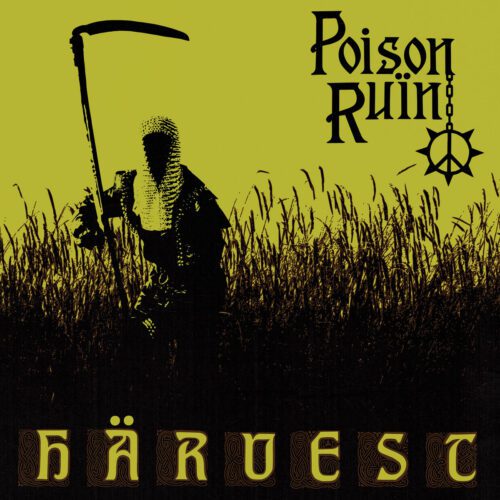Hear ye! Hear ye! Time to retrieve your burlap hooded cloak and your old D&D sword from the bottom of your closet (or your mom’s basement) because your favorite medieval punk-rockers, Philadephia’s Poison Ruin, were back with their new album, Härvest last week.
Having gained popularity extremely quickly over the last few years (they played their first show in the summer of 2021) due to their special blend of punk, heavy metal, and dungeon synth and use of strong and evocative imagery (Yin Yang and peace symbols, knights holding morning stars, etc.), the band have definitely made an indelible impression on the minds of post-punk fanatics around the globe. After two self-released tapes (I and II), a compilation of both these tapes on OZ label Urge Records in 2021 and the Not Today, Not Tomorrow 7” on Roachleg Records last year, the group has recently signed to a bigger and more established American label, Relapse Records.
In classic Poison Ruin fashion, the record opens with a soft and melancholy synth intro designed to put you in the mood for the anachronical fantasy-laden world you’re about to be immersed in. Once the band starts playing, the mood switches from dark-castle-in-the-fog to 80’s-skate-punks-hanging-at-Medieval-Times really fast. The chugging riffs on top of frantic drumming, the guitar leads reminiscent of epic war-themed heavy metal, and the vocals echoing like a bark in the night form a very pleasing new hybrid form of blackened post-punk. Mac Kennedy, singer-guitarist and founder of the project explores themes like resurrection, peasant revolt, and religion, forming a bridge from the painful existence in the dark ages to the general hardships of modern life in late-stage capitalism.
Production-wise, the band seems to have decided to keep it very lo-fi, giving the impression you’re listening to an overplayed Judas Priest cassette tape in your weird uncle’s shitty old car, which is not a bad thing if you consider yourself a 1600s anarcho-pilgrim type of person or simply enjoy lo-fi quality music while doing your daily plebeian chores such as plowing the fields or building a giant wicker man in honor of the pagan god of your choice.
In the end, all I can imagine while listening to it is a group of villagers using their scythes not to kill and destroy, but to reap the bountiful fruits of communal labour, which is what I think Härvest does best: conveying the sentiment that lower classes will always be stronger as a community.
























